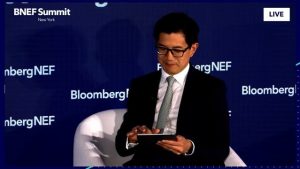Global investment in the low-carbon energy transition surged 17 percent in 2023 but BloombergNEF report finds this is not nearly sufficient to be on track for net zero by 2050.

The new report finds that 2023 resulted in a new record level of annual investment and demonstrates the resilience of the clean energy transition in a year of geopolitical turbulence, high interest rates and cost inflation.
The report finds that electrified transport is now the largest sector for spending in the energy transition, growing 36% in 2023 to $634 billion. This figure includes spending on electric cars, buses, two- and three-wheelers and commercial vehicles, as well as associated infrastructure.
Electrified transport overtook the renewable energy sector, which saw an 8% increase to $623 billion.
This figure reflects investment to construct renewable energy production facilities, such as wind, solar and geothermal power plants, and biofuels production plants – among other things. Power grid investment was the third-largest contributor at $310 billion. Grids are a critical enabler for the energy transition, and investment in them will need to rise in the coming years.
Meredith Annex, BNEF’s Head of Clean Power and co-author of the report, said: “Last year brought new records for global renewable energy investment. Strong growth in the US and Europe drove the global rise, even as China, the world’s largest renewables market, sputtered, recording an 11% drop. Despite a year of tough headlines, a record amount of offshore wind capacity also reached financial close.”
Despite the growth, the report found that the current level of investment in clean energy technologies is not nearly sufficient to set the world on track for net zero by mid-century.
According to the report, energy transition investment would need to average $4.8 trillion per year from 2024 to 2030 to align with BNEF’s Net Zero Scenario, a Paris Agreement-aligned trajectory from the 2022 New Energy Outlook. This is nearly three times the total investment observed in 2023.
Albert Cheung, Deputy CEO of BNEF, said: “Our report shows just how quickly the clean energy opportunity is growing, and yet how far off track we still are,”
“Energy transition investment spending grew 17% last year, but it needs to grow more than 170% if we are to get on track for net zero in the coming years. Only determined action from policymakers can unlock this kind of step-change in momentum.”
